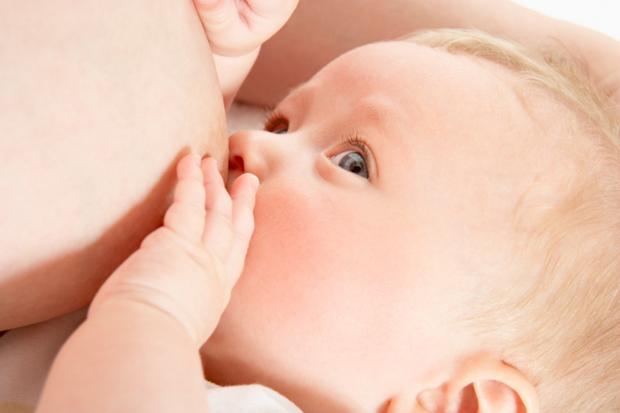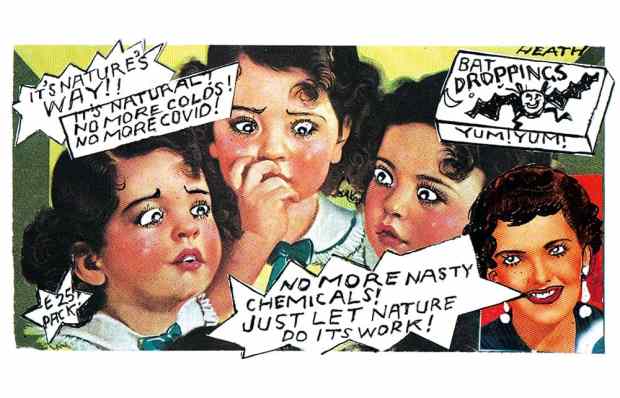There is really no question about whether it is best for babies to be breast-fed, at least for the first few weeks of life. Plenty of research from around the world has proved conclusively that breast-fed babies, who receive all the mother’s antibodies from the colostrum (produced during the first few days) and then the milk, have a better resistance to infections and viruses, and get them more mildly if they do succumb. They have fewer allergies, have a 20 per cent lower risk than formula-fed babies of dying between the ages of 28 days and one year, and may be protected against some diseases that strike later. Breast-feeding also creates a bond between mother and baby, helps the mother to reduce her weight back to pre-pregnancy levels, and reduces maternal stress levels and the incidence of serious post-partum depression. None of this is now a matter for debate.
So, given the massive benefits, why do some mothers in the developed world never start breast-feeding or, which is even more common, give it up in despair after a few days or weeks? It is certainly not for want of information about the benefits.
Not many issues are so affected by the issue of social class as that of breast-feeding. Of those who never start, far more mothers come from social groups C2, D and E than A, B and C1. It is a commonplace that working–class mothers rarely breast-feed. From the time when I had my first child, when I was 35, until now, I have known and known well a dozen women from C2, D and E who have not attempted breast-feeding. Their reasons were various but only one was too ill to do so. I asked the others, tactfully, why they had not considered breast-feeding, because I wondered why anyone would not. After all, if for no other reason, women consider the economic one. It is far more expensive to bottle-feed — formula milk, bottles, teats, sterilisers and their chemicals are expensive. Breast-feeding is free, and it is a myth that it costs a lot because the mother has to eat extra quantities of costly food. A good balanced diet and a lot of water are all that is required; and even women with poor diets manage to breast-feed successfully, simply because nature takes what it needs for manufacturing milk first. The mother’s own nutrition takes second place. (That is one of the biggest problems in the third world.)
The reasons I heard ranged from ‘I just don’t fancy it’ to ‘It’s disgusting’ and often included, ‘He says he isn’t having it, those belong to him.’ No one gave the halfway reasonable answer: ‘So that he can take his turn doing the night-feeds.’
But it is a little more complicated than I have made it sound, for two main reasons. A lot of working-class women have felt patronised by the breast-feeding fascists, who go on marches, display banners on their cars and take part in flash breast-feeding sessions in public places. Oh yes. When I lived in north Oxford, I felt sorry for any woman who dared to buy formula in the local chemist, because she risked running the gauntlet of these females, who would accost them and tell them aggressively why they should be breast-feeding, and list the harms they were doing to their child by not doing so. No wonder these self-appointed breast-feeding police were sworn at or even physically assaulted. How dare they? They have the facts on their side, not the right to bully.
But set aside the women who do not attempt to breast-feed, and look at the many others who decide to do it, want to do it, start doing it, but give up after a week or two. They are the ones who have a problem and need advice and assistance. In the last year alone, I have known four young women who have been in this situation. Two gave up breast-feeding and two struggled on painfully, eventually getting the help they needed.
It is a long time since I was a nursing mother, but given that I had my last baby when I was 44, not so long as it might be. I remember all too vividly the first days of trying to feed my daughter, and being in physical and emotional distress because I did not seem to be succeeding and had absolutely no idea why. The midwives in the hospital had been helpful, and when we were there apparently all was well, but once we got home, everything went downhill. My health visitor was worse than useless. She suggested I try both bottle and breast-feeding, which is not easy because the mechanism for delivering milk from breast and bottle teat is quite different and the baby becomes confused. I was hysterical, my child was hungry and cried non-stop — my world began to fall apart.
And then a neighbour called with a misdelivered letter. She had four children and had been a midwife. Within an hour she had checked the baby for tongue-tie and me for any breast problems, and discovered nothing wrong, but she showed me that my daughter was not latching on to the breast correctly. It does not always come instinctively to a baby, but once the whole little hungry mouth had been guided to take in a larger circumference of breast than merely the nipple, deep, satisfactory sucking commenced. We never looked back. My last baby fed easily from the start, perhaps because I had full confidence that I knew how to do it, perhaps I was more relaxed, or perhaps she was a better feeder. Whatever the reason, there was never a moment’s problem, she fed hugely and slept deeply, and so did we.
But what about those young mothers I know who have abandoned breast-feeding in despair — or come close to doing so? They include my own elder daughter, who, after a couple of weeks of misery with a hungry, crying baby, and at first no help and then conflicting advice, was given the name of a private breast-feeding counsellor and paid for two sessions with her. It was, she says, the best money she ever spent. The same happened more recently, with two friends. One paid; the other was extricated from her unhappy mess of being desperate to feed, not succeeding, and having a ravenous and hysterical baby, by someone who voluntarily visits such mothers and gives them an hour or two of advice and guidance. Bingo. And that, unless there is some other, possibly more serious problem — is all it takes. But those unhappy early days are very common — they probably happen to most first-time mothers who breast-feed.
The number of health visitors has been cut back so far that now the service barely exists. Midwives are not breast-feeding counsellors — they receive only an hour or two of tuition when they are training, and do not come out to see mothers beyond the first few days. There are voluntary advisers who work out of hospitals, but you cannot guarantee there will be one in your own area when you have problems. Where they do exist, they are very overstretched.
So much distress could be spared new mothers, and fathers, and babies, if a breast-feeding counselling service could be available universally and on demand. Perhaps those who could afford it might pay to subsidise those who could not. How many mothers would not gladly hand over hundreds of pounds to be got out of the awful cycle of hunger-crying-failure-to-feed-distress that goes round and round, causing untold pain, feeling of failure, rejection of the baby, sleep deprivation, strain on partnerships?
It is no use expecting the NHS to provide teams of free feeding counsellors as of this moment, but perhaps a start could be made by women who have fed their own babies successfully, and who have some spare time, volunteering to visit and help new mothers to feed successfully. Others might train and have a part-time job as paid breast-feeding counsellors. The time given up to a mother and baby is minimal by comparison with the rewards of setting them on the road to confident, successful, enjoyable, calm feeding. Those months during which I breast-fed my own babies were among the most fulfilled, contented and delightful of my life. I only wish I were not too old to volunteer myself.
Got something to add? Join the discussion and comment below.
Get 10 issues for just $10
Subscribe to The Spectator Australia today for the next 10 magazine issues, plus full online access, for just $10.
You might disagree with half of it, but you’ll enjoy reading all of it. Try your first month for free, then just $2 a week for the remainder of your first year.















Comments
Don't miss out
Join the conversation with other Spectator Australia readers. Subscribe to leave a comment.
SUBSCRIBEAlready a subscriber? Log in